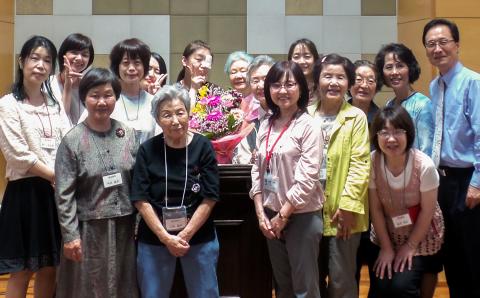Five Calvin Theological Seminary professors gathered in November to speak about their recently published books, which range from a book about Eve and the role of women in the church to a philosophical view of living everyday life.
Amanda Benckhuysen, professor of Old Testament and author of The Gospel According to Eve, began writing her book because the traditional interpretation of the Genesis account of Eve as being subordinate to Adam—that, as one church father said, Jesus came to save the world because of the sin of Eve—troubled her.
“The early church taught the view that Eve did not bear the full image of God,” said Benckhuysen in the hour-long panel discussion. “It bothered me because this view bolstered a social system of patriarchy that has had a huge effect on women even up to today.”
In her research, she discovered a range of commentators who believed that Eve was a “full imagebearer of God” and “a companion in life with Adam.”
Benckhuysen calls on the church to discuss the dominant view of Eve and how it has hurt women over the years. “I’ve tried to make accessible a range of women in history who had written about Eve positively.”
Gary Burge, dean of the faculty and author of The New Testament in Seven Sentences, boils the message of the New Testament down to seven fundamental themes: fulfillment, kingdom, cross, grace, covenant, spirit, and completion.
To flesh out these themes, he uses key sentences from Scripture, such as “You are the Messiah, the son of the living God” (Matt. 16:16); “By grace you have been saved, through faith … not by works” (Eph. 2:8-9); “You are a chosen people, a royal priesthood, a holy nation, God’s special possession” (1 Pet. 2:9); and “I saw a new heaven and a new earth” (Rev. 21:1).
“The vision,” Burge said, “is to help educate men and women in the church who have heard the same sermon too many times and want to go to the next level” in understanding key elements of the New Testament.
Young Ahn Kang said his book, Philosophy of Everyday Life, reflects the thought contained in Christian philosophy as well as beliefs of Confucianism, Buddhism, and Daoism. “These all share the concern for everyday life,” said Kang, a visiting professor of philosophical theology. “There are rules of life: be mindful in all we do, in our study, in our work, in our relaxation. Also, be grateful, because our being is based on others.”
Robert Keeley, visiting professor of discipleship and faith formation, cowrote Dear Parents: a Guide for Family Faith Formation with his wife, Laura. They wrote the book for parents both in and out of church to help their children grow in faith. It introduces readers to four building blocks of faith to help children to find their place in God’s family, learn God’s story, live in hope, and discover their calling.
Professor of New Testament Mariano Avila talked about Efesios, his two-volume Spanish-language commentary on Ephesians. It explores how Paul’s letter to the Ephesians challenged the Roman Empire but also is valuable especially for readers in Mexico and Latin America, where a “machismo” culture often oppresses women.
“The central idea of Ephesians is power,” Avila said. “Ephesians helps organize new ways of family life.”
About the Author
Chris Meehan is a freelance writer and commissioned pastor at Coit Community Church in Grand Rapids, Mich.








